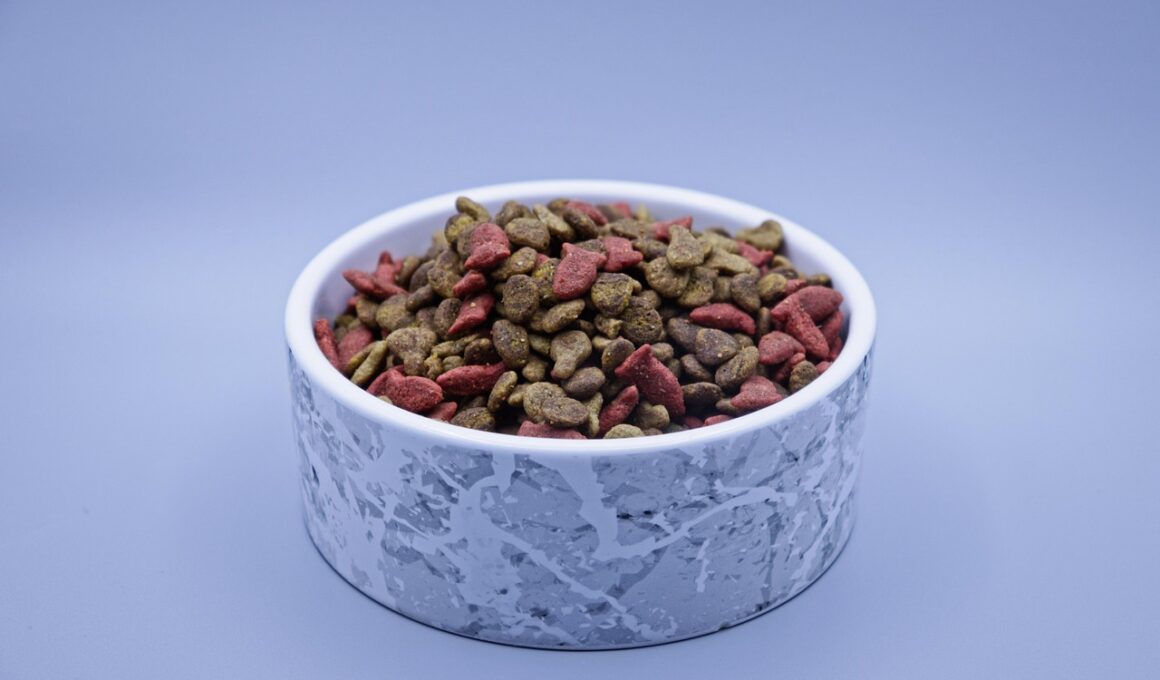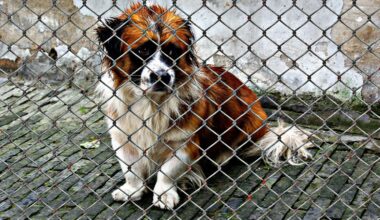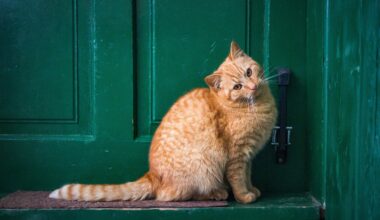Grain-Free Diets: Are They Suitable for Adult Cats?
The debate surrounding grain-free diets for adult cats has gained traction. Many cat owners are considering this dietary change for their feline companions. This movement towards grain-free options often stems from the idea that putting cats back to a more natural diet is healthier. However, it’s essential to evaluate the nutritional adequacy. Cats are obligate carnivores, meaning their bodies are designed to metabolize animal proteins better than plant-based sources. While cats can digest small amounts of carbohydrates, their primary source of energy should come from proteins and fats. Therefore, when switching to a grain-free diet, it’s crucial to ensure that the food still contains adequate protein and other vital nutrients. Merely removing grains does not guarantee that the food is of high quality. Many grain-free options are high in unhealthy fillers or low in essential nutrients. Reading labels and understanding the underlying ingredients is key to making informed choices. Consulting with a veterinarian is also advisable before making any significant dietary changes.
Kittens and adult cats have different nutritional requirements, and focusing on adult cat nutrition is necessary. For adult cats, a balanced diet rich in protein is crucial to maintaining muscle mass. Protein should come from high-quality animal sources, such as chicken, turkey, or fish. When selecting grain-free options, look for those that list real meat as the first ingredient. This ensures that the primary source of nutrition is protein. Cats also require a specific balance of vitamins and minerals, which can be negatively affected by poorly formulated grain-free diets. Feeding adult cats low-quality grains can lead to weight gain and related health problems. Conversely, a well-formulated grain-free diet can support healthy weight management and overall well-being. Ultimately, the choice to feed grain-free should be based on individual cat needs, health conditions, and personal preferences. Monitoring your cat’s weight and health regularly helps ensure your chosen diet supports their lifestyle, energy levels, and overall health. Supporting their nutritional needs while providing variety is key to satisfied and healthy adult cats.
Potential Health Benefits of Grain-Free Diets
Grain-free diets have been heralded for potential health benefits in adult cats, attracting many pet owners. One of the primary arguments in favor of these diets is that they may alleviate allergic reactions. Grain allergies can manifest in various ways, including skin irritations and digestive issues. For cats showing signs of allergies linked to grains, a grain-free diet might provide relief. Additionally, some advocate that these diets help improve digestion and reduce gastrointestinal problems. Grains can be a challenge for cats with sensitive stomachs, leading to discomfort and irregular bowel movements. Grain-free diets, typically higher in protein and lower in carbohydrates, can contribute to better digestion for some cats. This change may enhance nutrient absorption as well. Studies suggest that feline weight management can also improve with grain-free options. Reduced carbohydrate intake may help prevent obesity by minimizing calories in a cat’s diet. It is essential to consult a veterinarian before making dietary changes, especially if an allergy is suspected, as they can provide tailored recommendations suited to your cat’s health profile.
While there are potential benefits, several concerns arise regarding grain-free diets for adult cats. The primary concern is that many grain-free formulations substitute high-quality grains with unhealthy fillers that lack nutritional value. Ingredients such as peas, potatoes, and lentils often replace grains but can lead to imbalances in vital nutrients. These ingredients may also pose their challenges for digestion in some cats. Furthermore, some grain-free diets have been linked to urinary issues, mainly due to insufficient moisture content in dry food formulations. Cats naturally have a low thirst drive, and feeding them dry food without adequate moisture can lead to dehydration. This dehydration can increase their susceptibility to urinary problems, including crystals or stones in the bladder. Another aspect to consider is the association between grain-free diets and dilated cardiomyopathy (DCM), a serious heart condition. Although the link is not entirely understood yet, some veterinary diets have urged caution in choosing grain-free options due to the potential health risks. Thus, it is important to prioritize overall nutrition and consult with pet healthcare providers to ensure optimal health for adult cats.
Choosing the Right Grain-Free Diet
Selecting the right grain-free diet for your adult cat involves careful consideration and research. Not all grain-free cat foods are created equal, and some may not meet the specific dietary needs of felines. It’s vital to check the ingredient list and make sure that the first ingredient is a named meat, such as chicken or lamb. This indicates a high protein content that is beneficial for your cat’s dietary requirements. Investigating the protein and fat content is equally important, ensuring they align with the nutritional needs of adult cats. Another critical aspect is the inclusion of essential vitamins and minerals for maintaining health. Look for diets fortified with taurine, an amino acid vital for heart health. Consulting with a veterinarian before transitioning your cat to a new diet is essential to understand its specific needs. Transition to the new diet gradually over several days to minimize gastrointestinal upset. Monitor your cat’s health closely during this transition and adjust as necessary, ensuring their happiness and well-being are prioritized.
In addition to ingredients, several factors influence the effectiveness of grain-free diets for adult cats. Age, weight, health status, and lifestyle should all be considered when choosing their ideal food. For instance, a less active cat may require fewer calories than a more energetic one. Additionally, those with certain health conditions may need specialized diets to manage their issues better. All these factors dictate unique dietary preferences and nutritional needs. Grain-free may suit some cats, while others may thrive on a mixed or grain-inclusive diet. Providing balanced meals for cats can lead to better overall health and happiness, and it’s essential to tailor their diet accordingly. Regular check-ups with the veterinarian play a significant role in determining any necessary dietary adjustments. Tracking their weight and health condition at each visit helps refine their nutritional intake. Ensuring variety while maintaining balanced nutrition is essential in contributing to their well-being. Providing different flavors and protein sources can help keep your adult cat engaged and satisfied with their meals.
The Importance of Hydration
Hydration is a critical aspect of adult cat nutrition. Adequate fluid intake is essential to their overall health. Cats, especially those on dry food diets, can be prone to dehydration, which may lead to serious health issues. While grain-free diets can contribute to better digestion, they often come in dry kibble form, which lacks moisture content. Hence, offering your cat access to fresh water at all times is essential for encouraging hydration. Some cat owners incorporate wet food into their grooming routine, providing hydration along with nutrition. Canned food typically contains about 70–80% water, making it a great option for promoting fluid intake. Moreover, monitoring your cat’s water intake can help identify any changes in their behavior or health. Ensure they have access to clean, fresh water continuously, as hydration supports kidney health, digestion, and overall well-being. Consider using a cat water fountain, which may encourage drinking as cats tend to prefer fresh running water. Ultimately, addressing hydration alongside diet helps to support their overall health.
In conclusion, the decision to feed adult cats a grain-free diet is multifaceted and should be made based on careful consideration of their individual needs. While there may be arguments for the benefits of grain-free feeding, it is essential to balance these with potential risks and ensure that the chosen diet maintains a high nutrient profile. Cat owners are encouraged to conduct thorough research, make informed dietary choices, and consult with veterinarians to ensure their cat’s nutritional needs are met. The right diet contributes significantly to their well-being, supporting not only their physical health but their happiness and vitality as well. Monitoring any changes in health status post-transition can provide insights and guide further dietary adjustments. Determining what works best can take time, and each cat has its unique preferences and requirements. A carefully balanced diet, including high-quality proteins, healthy fats, and necessary moisture, is crucial in promoting a healthy lifestyle. Remember, every cat is different, influenced by factors like age, weight, and health status. Following these guidelines can help enhance and enrich the diet of your adult feline companions.


